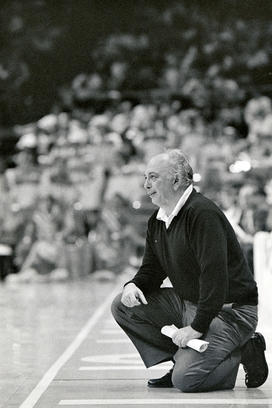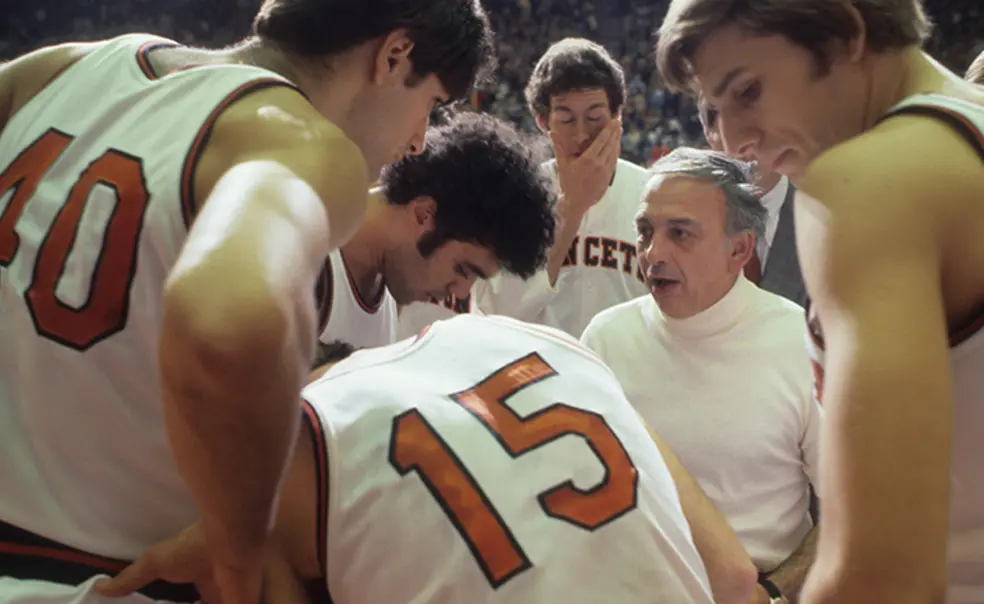Famed Basketball Coach Pete Carril Changed the Game
The hard-nosed creator of the ‘Princeton offense’ has died at the age of 92
Hall of Fame men’s basketball coach Pete Carril, who left a lasting mark on the sport and the University with what became known as the “Princeton offense,” died Aug. 15. He was 92 years old.
Carril was demanding in practices, demonstrative on the sidelines, and highly regarded in the fraternity of college coaches — a group that now includes several of his former players. He led Princeton to 13 Ivy League championships, 11 NCAA Tournaments, and 514 victories in 29 seasons as head coach, a run that ended in 1996 when his Tigers defeated Penn in a one-game Ivy playoff and then upset UCLA, the defending NCAA champion, in the opening round of the NCAA Tournament. Gabe Lewullis ’99 scored the winning basket in the closing seconds on a backdoor layup, one of the trademarks of Carril’s offensive system.
“Many lessons learned under Coach Carril, by many players, served them well through the years,” said former Princeton athletics director Gary Walters ’67. “It’s very difficult to effectively assess his impact other than to say: I don’t know how you could perform better.”
Carril came to Princeton in 1967 from Lehigh, in his hometown of Bethlehem, Pennsylvania, and succeeded Butch van Breda Kolff ’45, who had coached him at Lafayette. According to a 1968 article in PAW, he was drawn to Princeton “because of its high academic standards, and because he is opposed to athletic scholarships.”
“You play basketball because you love it,” Carril said in the story. “You play it with integrity and you play it to win.”
Carril became known for the Princeton offense, a set of tactics that eventually included relentless pursuit of 3-point shots when the college game added the 3-point line in 1986. Eyebrow-raising back then, that strategy has since been adopted across the NBA.

The 1996 win over UCLA was a crowning achievement for a coach who, despite a remarkable record of successes that included the 1975 NIT championship, suffered a series of agonizing near-misses on the national stage. Princeton’s one-point loss to heavily favored Georgetown in the 1989 NCAA Tournament is perhaps the heartbreaker most discussed among Princeton fans, but the Tigers also dropped a 68-64 game to Arkansas the following year and a 50-48 decision to Villanova in 1991.
In his later years, Princeton had a reputation for playing at a slow pace, particularly against more athletic teams like Georgetown and UCLA. But that style was not always Carril’s calling card: His 1971-72 team averaged 79.7 points per game, a program record that stood until last season.
After leaving Princeton in 1996, Carril became an assistant coach for the Sacramento Kings. In 1997, he was inducted in the Naismith Memorial Basketball Hall of Fame, where two Tiger greats, Bill Bradley ’65 and van Breda Kolff, welcomed him to the stage. Princeton named the Jadwin Gym court for him in 2009, and in 2012, the University awarded him an honorary degree.
“When you’re a coach, you have to have an impact on your players. You must do that,” Carril said in his Naismith acceptance speech. “But the more I taught them, the more they learned, the more I learned from them — which is a secret of life. You’re always learning something, if you pay attention.”
Watch Carril’s speech when he was inducted into the Naismith Memorial Basketball Hall of Fame in 1997:










No responses yet